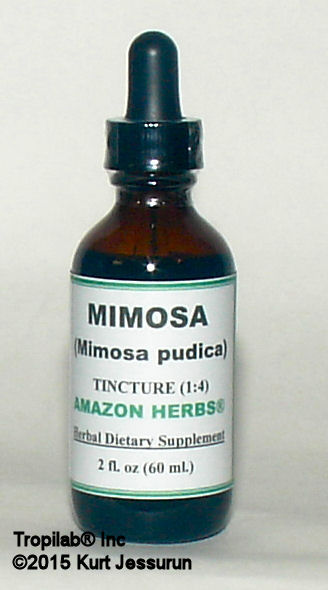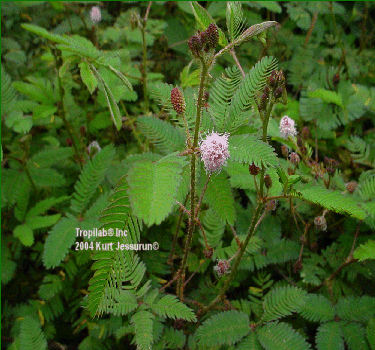 |
 |
| MIMOSA TINCTURE (tinctura MIMOSA PUDICA) from AMAZON HERBS® |
 Overview
OverviewMimosa (sensitive plant) is a tropical plant with nerve regenerative potential. An evergreen shrub that is grown for its curiosity; the fern like leaves close up and droop when touched, usually re-opening within minutes. It has prickly stems and small, fluffy, ball shaped pink flowers. Mimosa pudica is extensively used in Ayurveda, Unani & Homeopathic Medicine for thousands of years. This plant is used widely in Traditional Medicine and has many benefits. In India it is used on glandular swellings and leaf-sap is applied for sinus disorders. In Senegal, the leaves are used for lumbago (pain in muscles and joints of the lower back) and nephritis (inflammation of kidneys). All plant parts are used against glandular tumors and uterine cancer. Mimosa is a potential rich source of natural antioxidants. Constituents Mimosine (a toxic alkaloid), a adrenaline-like substance, tannin, crocetin dimethyl ester, a mucilage composed of d -xylose and d -glucuronic acid, tubulin, phytohormones-turgorines (derivatives of 4-O-(ß-D- glucopyranosyl-6-sulphate), gallic acid, calcium oxalate crystals, C-glycosylflavones. Root extract contains 10% tannin, ash, calcium oxalate crystals and mimosine. Pharmacology  The mimosine has potent antiproliferative properties (inhibit cell growth on tumor cells)
and apoptosis (programmed cell death) effects.
The mimosine has potent antiproliferative properties (inhibit cell growth on tumor cells)
and apoptosis (programmed cell death) effects.Mimosa pudica has been shown to alleviate pain, and is also used as an antispasmodic, muscle relaxant, and anti-inflammatory. A 1:1 ethanol-water extract is very effective for pain management and is currently patent pending for pain relief. Mimosa produces an antidepressant-like profile similar to two tricyclic antidepressants Clomipramine (brand-name Anafranil®), Desipramine (brand names: Norpramin® and Pertofrane®). The wound healing activity of Mimosa pudica root methanolic extract shows very good wound healing activity when compared to the standard drug Gentamicin. Histopathological studies reveal that the concurrent administration of carbon tetrachloride with the Mimosa extract exhibited protection of the liver tissue. A study has confirmed the hepato-protective activity of methanolic extract of Mimosa pudica which may be attributed to its antioxidant properties. Applications A mild diuretic that seems to enhance the regeneration of nerves. The plant is traditionally used for bleeding disorders like menorrhagia (excessive blood loss during menstruation), dysentery with blood and mucus, piles. Used as a mild sedative and for many conditions related to stress and agitation. Effective in relieving the symptoms of rheumatoid arthritis and muscular pain. In Chinese Traditional Medicine (CTM), Mimosa is used for relieving anxiety, stress and depression. Mimosa also depresses duodenal contractions (similar to atropine sulphone). Treatment for Lyme disease (antiparasitic) Mimosa has a broad spectrum of activity against many of the parasites that are associated with this disease; it may also have a strong effect on Babesia (malaria-like parasite that infects red blood cells). Lyme disease is a common tick-borne disease. Infection is caused by Borrelia burgdorferi; a spiral-shaped bacterium (spirochete). The spirochete enters the skin at the point of the tick bite. Dosage Tincture: 1 - 3 ml. (1 - 3 full pipettes) daily. Consult your homeopath or herbalist. Infusion (herbal tea): 1 – 2 cups daily. Precaution Do not use when pregnant, when operating equipment or using an antidepressant. References Early changes in membrane permeability, production of oxidative burst and modification of PAL activity induced by ergosterol in cotyledons of Mimosa pudica Stéphanie Rossard, Estelle Luini, Jean-Michel Pérault, Janine Bonmort and Gabriel Roblin Laboratoire de Biochimie, Physiologie et Biologie Moléculaire Végetales, UMR CNRS 6161, University of Poitiers, 40, Avenue du Recteur Pineau, F-86022 Poitiers, France Biochemical mechanisms and effects of Mimosa pudica (Linn) on experimental urolithiasis in rats. Joyamma V, Rao SG, Hrishikeshavan HJ, Aroor AR, Kulkarni DR. Department of Pharmacology, Kasturba Medical College, Manipal, India Mimosa pudica may possess antidepressant actions in the rat. Molina M, Contreras CM, Tellez-Alcantara P. Laboratorio de Conducta, Instituto de Investigaciones Psicologicas, Universidad Veracruzana, Mexico. mimoli@bugs.invest.uv.mx Mimosa pudica may possess antidepressant actions in the rat. Molina M, Contreras CM, Tellez-Alcantara P. Laboratorio de Conducta, Instituto de Investigaciones Psicológicas, Universidad Veracruzana, México. mimoli@bugs.invest.uv.mx The above presentation is for informational and educational purposes only. It is based on scientific studies (human, animal, or in vitro), clinical experience, or traditional usage. For many of the conditions discussed, treatment with prescribed (RX) or over - the - counter medication (OTC) is also available. Consult your doctor, practitioner, and/or pharmacist for any health problem and before using dietary supplements or before making any changes in prescribed medications. |
For the right freight rate, shipping charges, conditions and delivery service, please visit our Webstore page! |
|
TROPILAB® INC copyright disclaimer |